If you've found yourself with more baked beans than you can eat, you may be wondering - can you freeze baked beans? This article covers everything you need to know about making your leftover baked beans last longer.

Baked beans - a sweet and tangy barbecue side dish that people seem to love or hate. As a kid, I was in the latter camp. But, now that I'm an adult, I absolutely can't get enough baked beans.
I prefer to make my baked beans from scratch. But, since it's just my fiancé and I at home, we often end up with leftovers.
So, what do I typically do with all of those leftovers? Well, I freeze them!
Cooked baked beans, whether they're canned or homemade, freeze quite well.
In fact, I highly recommend cooking up a double batch of homemade baked beans next time you make them. Then, you'll have a stash of leftovers in your freezer you can use when you just don't feel like cooking.
So, if you’ve found yourself with some leftover baked beans, keep reading to learn everything you need to know about how to freeze them so you can enjoy them another day.
Disclaimer: Some links throughout this post are affiliate links. As an Amazon Associate, I earn from qualifying purchases. You can learn more by visiting my Affiliate Disclosure Page.
What Are Baked Beans?
Baked beans are a classic summer side dish popular in American, Canadian, and British cuisine. Most recipes call for navy beans to be slowly cooked in a sweet and tangy tomato-based sauce.
Considered a summertime comfort food, baked beans are often served at barbecues, picnics, and cookouts alongside hot dogs, hamburgers, and other grilled fare.
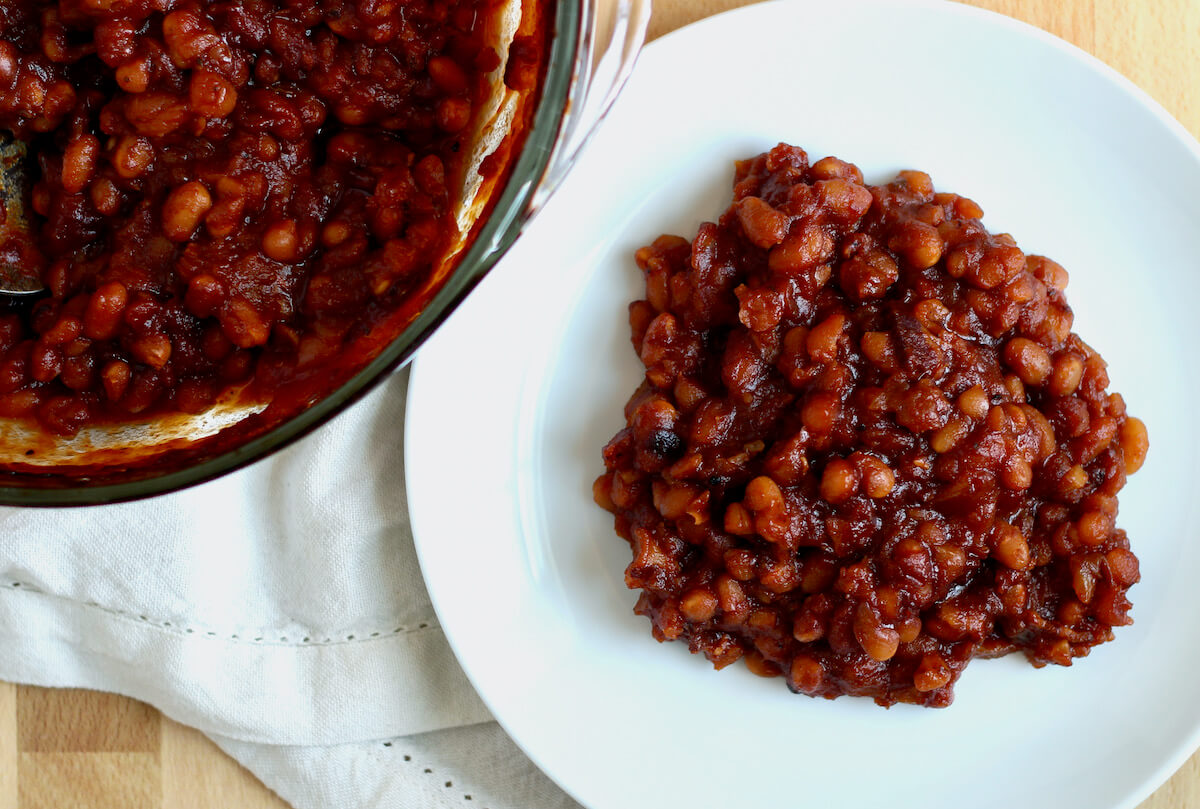
Can You Freeze Baked Beans?
Okay, so let's get down to it. Can baked beans be frozen?
Yes, you can! In fact, baked beans freeze quite well.
So, if you've found yourself with leftover baked beans after a summer party, fear not! You can save your baked beans to enjoy another day.
Benefits of Freezing Baked Beans
According to the USDA, an estimated 30-40% of the food supply in the United States is wasted every year.
Personally, I find that statistic mind-boggling. And while it may sound silly, freezing baked beans (or any leftovers), is an easy way to do your part to reduce food waste.
Here are a few more reasons you might consider freezing leftover baked beans:
- Reduce Food Waste- Freezing leftover baked beans prevents food waste by extending their shelf life. Instead of throwing them away, consider saving them for another day.
- Save Time- I love having leftover side dishes, like baked beans, in my freezer. They make dinner quick and easy because I only have to cook the main course.
- Budget-Friendly- By freezing leftover baked beans, you can make the most of the food you buy and stretch your grocery budget.
Canned vs Homemade
When it comes to freezing baked beans, both canned baked beans and homemade baked beans will keep for about 6 months in the freezer. However, there are some other considerations to keep in mind whether you're using canned beans or homemade beans.
In general, homemade baked beans seem to hold up better texturally to freezing. This is because you have more control over the doneness of the beans when you make them yourself.
Additionally, if you're planning to freeze canned baked beans, it's really only necessary to do so after opening the can. Since canned baked beans already have a long shelf life, there's no need to freeze them unless they've already been opened.
Finally, never freeze canned baked beans inside the can they come in. The frozen beans will expand inside the can, likely causing it to burst. Instead, transfer them to a freezer-safe, airtight container or plastic storage bag.
What You'll Need
Freezing baked beans doesn't require any special equipment. But, there are a few basic items you'll need to freeze them properly.
- Freezer-Safe Plastic Bags or Containers- Opt for BPA-free plastic containers or freezer-safe glass containers.
- Labels and Markers- To write the name of the recipe and the date it was frozen.
- Measuring Cups or Kitchen Scale- If you're portioning out your beans, measuring cups or a food scale may come in handy.
- Aluminum Foil or Plastic Wrap- If you're freezing your leftover baked beans inside of a casserole dish, wrapping them with aluminum foil or plastic wrap will help protect against freezer burn.
How To Freeze Baked Beans
With just a few simple steps, you'll be on your way to preserving your delicious baked beans in no time.
Step 1: Cool
Before you freeze your baked beans, you want to let them cool completely. This can be done quickly by spreading the baked beans out into a thin layer and placing them in the refrigerator.
Cooling helps preserve the texture of the beans and prevents excessive ice crystals from forming in the freezer.
Step 2: Portion
Next, you want to decide how you're going to portion out the baked beans.
If you're freezing them in advance of a large gathering, it's perfectly fine to freeze the entire baking dish. However, if you only want to reheat a small amount of baked beans at a time, I recommend storing them in individual or family-sized portions instead.
Step 3: Store
Once you've decided on portion sizes, you need to find the right containers for the job.
Choose a freezer-safe container that allows for minimal air space while still leaving about a 1-inch gap at the top for expansion. This is especially important if you're using glass containers.
If you're using plastic freezer bags, dipping them in a bowl of water will help remove excess air before sealing.
Step 4: Label
Now, you want to clearly label each container or bag with the date of freezing and the contents. Labeling your leftovers will help you keep track of the storage time and easily identify the baked beans later.
Trust me, I've skipped this step before and have been left scratching my head at unidentified frozen food more times than I like to admit.
Step 5: Freeze
Now all that's left to do is stick them in the freezer and remember to eat the baked beans before they go bad!
See? So simple!
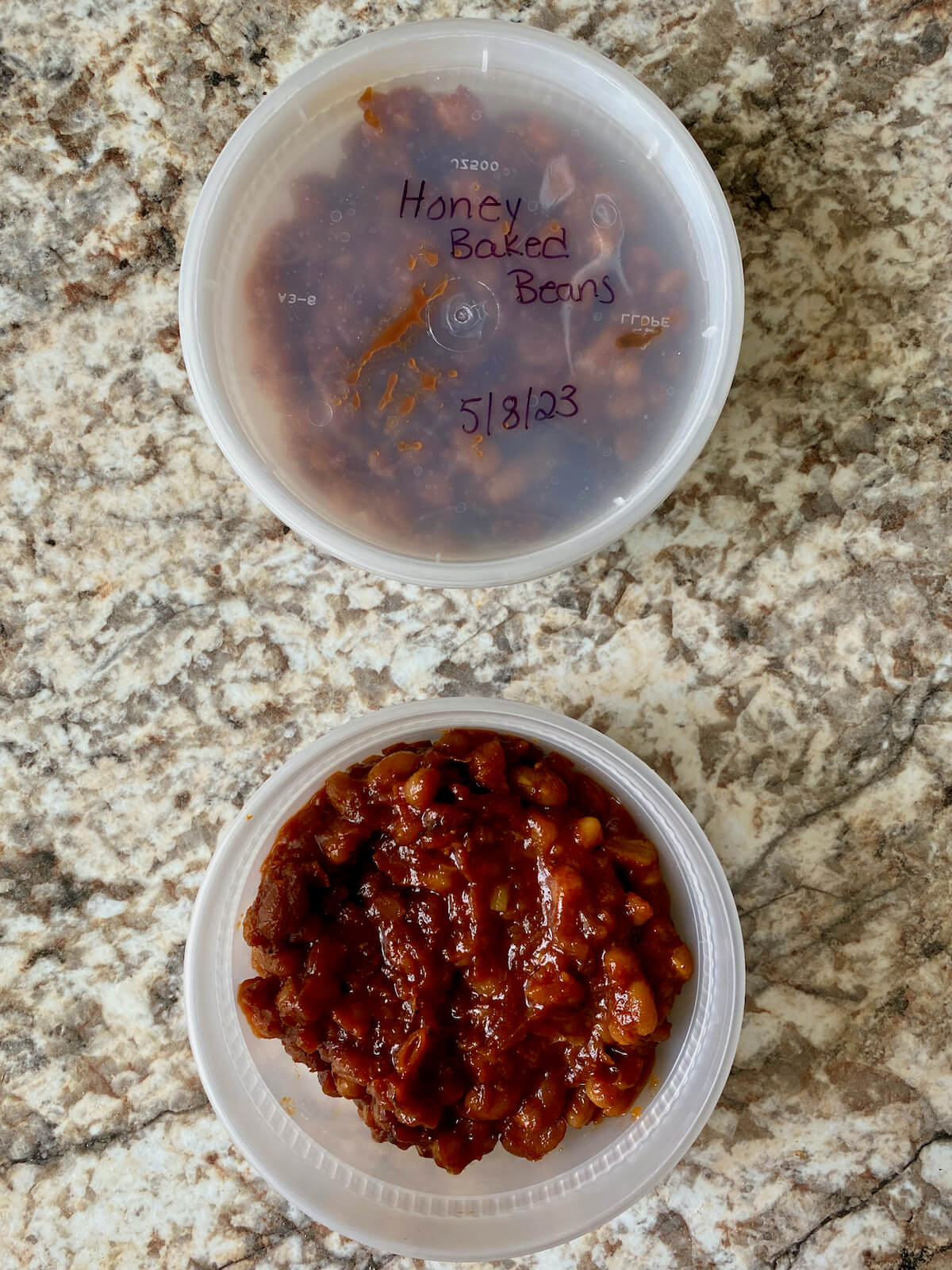
How Long Do Baked Beans Last in the Freezer?
In most cases, baked beans will maintain optimum quality in the freezer for about 3-6 months. While they may still be safe to eat beyond that time, their flavor and texture may decline.
Tips for Freezing Baked Beans
- Don't freeze in the can. Canned baked beans should never be frozen inside the can because they could burst, leaving a mess in the freezer.
- Spread on a baking sheet to cool quickly. If you need to cool a large batch of baked beans quickly, spread them out evenly on a baking sheet and stick them in the fridge for 1 hour.
- Freeze in portions. Portion the baked beans out into individual or family-sized portions for easy and convenient reheating.
- Leave space. If freezing in plastic or glass containers, remember to leave about 1 inch of headspace to account for expansion.
How to Thaw Baked Beans
When it comes to thawing frozen baked beans, you have a few options.
Refrigerator
One way to defrost baked beans is to leave them in the refrigerator overnight. Depending on the size of the container, baked beans may take anywhere from 12-24 hours to thaw in the refrigerator.
This method thaws the baked beans gradually, helping to preserve their texture and limit bacterial growth.
Microwave
For smaller or individual portions of baked beans, the microwave is another option for thawing. This method thaws the baked beans quickly, but often unevenly, leading to mushy or dry baked beans.
To thaw baked beans in the microwave:
- Place the frozen baked beans on a microwave-safe dish.
- Cover them with a lid or damp paper towel.
- Microwave the beans on HIGH in 30-second intervals, stirring after each interval, until fully warmed through.
Saucepan
Another great method for thawing is in a saucepan on the stovetop. This method can be used for larger portions of beans. It is quick, easy, and typically offers better results than microwaving.
To thaw baked beans on the stovetop:
- Place the frozen baked beans in a small saucepan over low heat.
- Add a splash of water or broth to thin the beans and help them thaw more quickly.
- Heat the baked beans gradually, stirring frequently, until warmed through.
How to Reheat Frozen Baked Beans
For best results when reheating, thaw your leftover baked beans overnight in the refrigerator.
Oven
Preheat the oven to 350°F. Transfer the leftover beans to an oven-safe dish and cover with foil. Bake for 20-30 minutes, stirring occasionally, until heated through.
Stovetop
Transfer the leftover beans to a small saucepan and add a splash of water or broth. Heat over medium heat, stirring occasionally, until heated through.
Microwave
Transfer an individual portion of leftover beans to a microwave-safe dish and cover with a damp paper towel. Microwave on HIGH for 1 minute, stirring stirring halfway through.
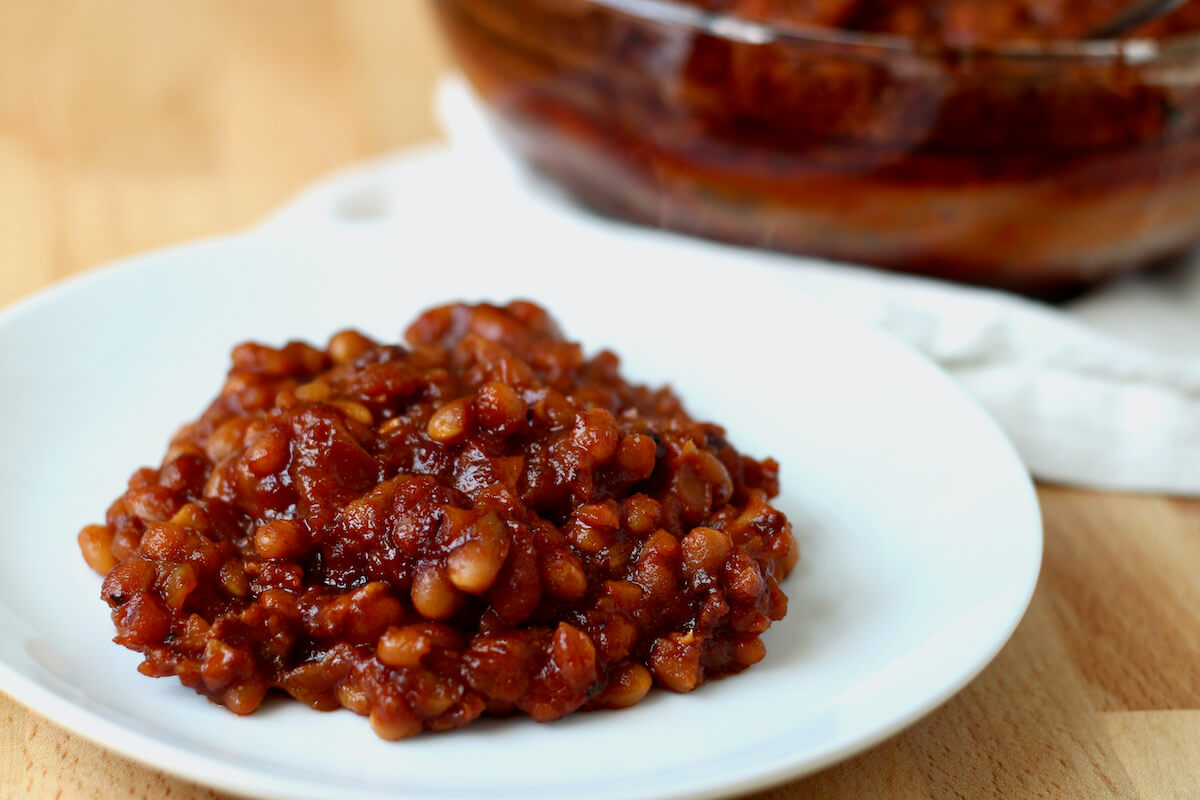
How Can You Tell If Baked Beans Have Gone Bad?
If your baked beans have been sitting in the refrigerator or freezer for quite some time, you may be wondering if they're still good to eat. Relying on your senses can help you determine if your baked beans have gone bad.
Here are a few signs to look for:
- Visible mold or discoloration
- Foul, rotten, or musty odor
- Slimy or excessively mushy appearance
- Unpleasant or off flavor
- Freezer-burnt baked beans will often appear dull in color and have large ice crystals
Can You Refreeze Baked Beans?
Baked beans that have been thawed can be refrozen if they have been handled properly. Baked beans that were thawed completely in the refrigerator can be placed back in the freezer with limited side effects.
Additionally, baked beans that have been thoroughly reheated to 165°F and cooled properly can be refrozen. However, in this case, the beans may be more susceptible to texture and flavor changes.
Overall, I recommend avoiding refreezing baked beans if possible. Refreezing baked beans can lead to texture changes, flavor changes, and food safety concerns.
Baked Bean Recipes
If you're looking for a homemade baked bean recipe, these Honey Baked Beans really hit the spot. The scratch-made baked beans feature dried navy beans, bacon, and honey, creating a sweet, tangy, and oh-so delicious barbecue side dish.
How to Use Leftover Baked Beans
You may think baked beans are just a summer side dish, but they actually make quite versatile leftovers. With a little creativity, baked beans can easily be transformed into a variety of new and exciting meals.
Put a little baked bean twist on some Mexican classics like tacos, burritos, quesadillas, and nachos. Or mix them into your favorite chili recipe for a sweet and tangy burst of flavor.
Baked beans also pair particularly well with egg dishes. Add baked beans to a frittata or omelet, or serve them alongside some scrambled eggs on toast for a hearty breakfast.
Finally, turn leftover baked beans into a delicious barbecue sandwich or bean burger for a vegetarian version of everyone's favorite cookout foods.
Frequently Asked Questions
Store leftover baked beans in an airtight container in the refrigerator for up to 4 days or in the freezer for up to 6 months. If serving baked beans at a party, remember not to leave them at room temperature for longer than 2 hours to prevent foodborne illness.
Yes, baked beans freeze very well. With just a few simple steps, you can easily preserve your canned or homemade baked beans.
Some baked bean recipes or products contain meat like bacon, sausage, or ham. You can freeze homemade baked beans with meat in the same way as you would freeze vegetarian baked beans.
Conclusion
So, as you can see, freezing baked beans is a fantastic way to reduce food waste, save money, and make meal planning easier. Whether you stocked up at a sale or just have a little leftover, I hope this guide helped you preserve your delicious baked beans.
Let's Connect!
Be sure to leave a comment below if you have any questions. You can also connect with me on Instagram, Facebook, Pinterest, or via email at [email protected].

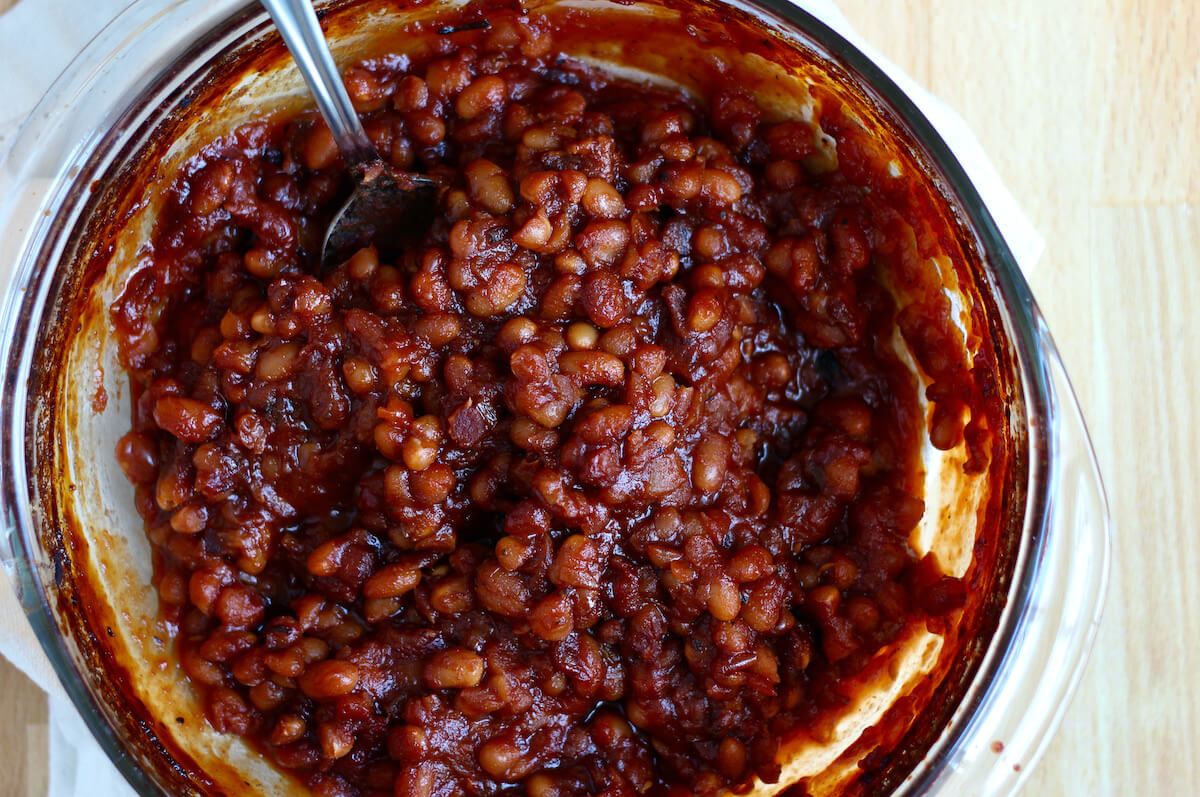







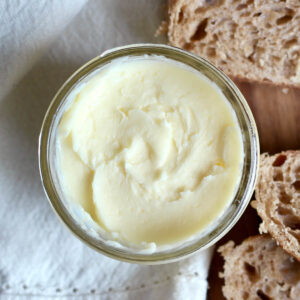
Comments
No Comments